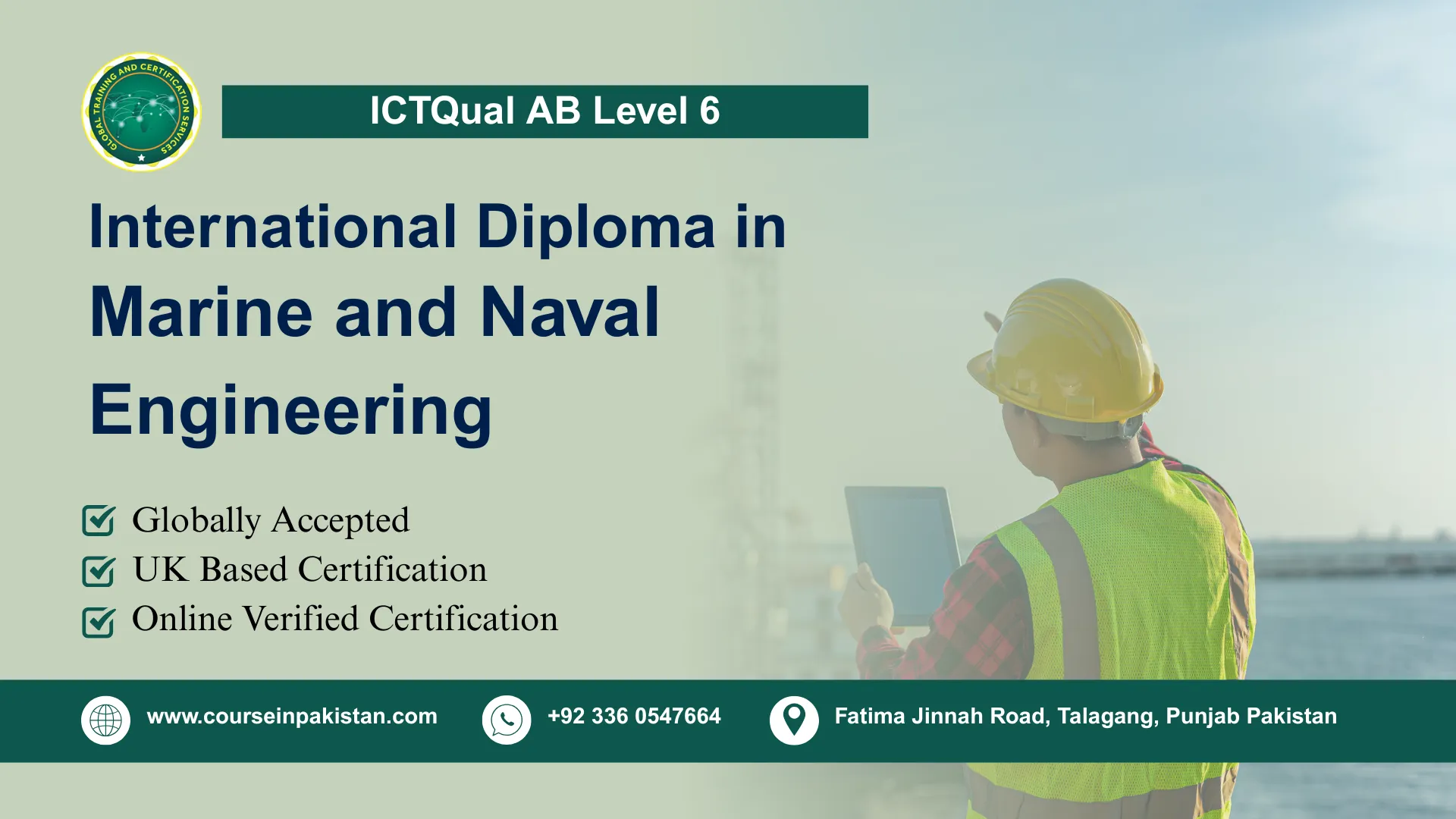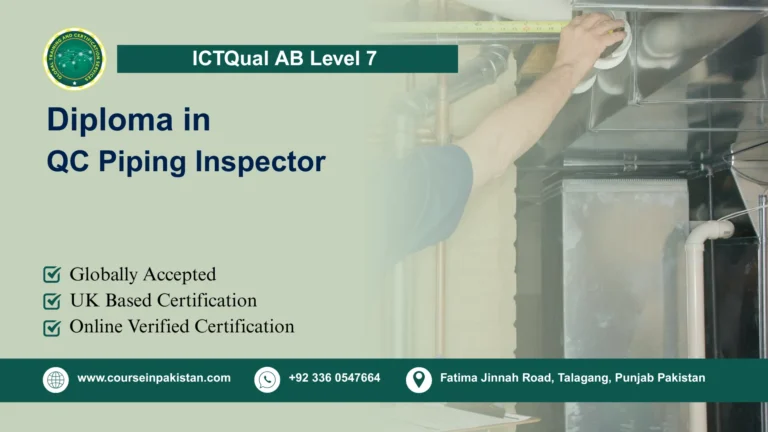
The ICTQual AB Level 6 International Diploma in Marine and Naval Engineering is a globally recognized qualification designed to equip learners with advanced knowledge, technical expertise, and industry-relevant skills in marine and naval engineering. This diploma program emphasizes modern engineering practices, shipbuilding technologies, naval architecture, and marine systems, enabling learners to excel in both commercial and defense maritime sectors. With a focus on international standards, the course provides the right blend of theoretical understanding and practical application, preparing professionals to take leadership roles in ship design, maintenance, and marine operations.
This diploma is ideal for individuals who aspire to enhance their career in the marine and naval industry, whether starting fresh or building on years of professional experience. It develops competencies in propulsion systems, safety management, vessel operations, and cutting-edge naval technologies, ensuring graduates can meet global workforce demands. By pursuing this qualification, learners can achieve a prestigious credential that opens doors to international employment opportunities, higher studies, and professional recognition.
Course Overview
The ICTQual AB Level 6 International Diploma in Marine and Naval Engineering is a 360-credit, assignment-based certification that offers maximum flexibility, allowing learners to study at their own pace from anywhere in the world. This diploma is British Council verifiable, MOFA and Embassy attestable, making it highly valuable for job placement, immigration purposes, and Iqama approval.
The qualification is suitable for both fresh students and experienced professionals. Fresh learners are required to complete 36 mandatory assignments within 3 years, ensuring a comprehensive learning journey. On the other hand, experienced and competent professionals with at least 6 years of relevant, verifiable experience can fast-track their certification by defending their knowledge through professional discussion meetings with ICTQual AB Approved Assessors, without needing to complete all assignments.
This dual pathway ensures that both newcomers and seasoned professionals can achieve the diploma in a way that best matches their background and career goals. Whether through structured learning or recognition of prior experience, this program provides an accessible route to achieving a globally respected qualification in marine and naval engineering.
Key Highlights of the Course:
- 360-credit, assignment-based qualification with global flexibility
- British Council verifiable, MOFA & Embassy attested certification
- Suitable for both fresh learners and experienced professionals
- Fast-track route available for candidates with 6+ years of relevant experience
- Ideal for international job opportunities, Iqama approval, and career advancement
Course Benefits
Global Recognition
- British Council verifiable and Embassy attested qualification
- Recognized across industries and countries, ensuring global employability
Career Advancement
- Boosts opportunities in marine, naval, and defense engineering sectors
- Enhances eligibility for higher-level managerial and technical roles
Flexible Learning
- Self-paced and assignment-based, allowing learners to study from anywhere
- Options for fresh students and experienced professionals
Fast-Track Opportunities
- Recognition of prior learning for experienced candidates
- Certification achievable in a shorter timeframe through professional discussions
Job and Immigration Support
- Ideal for Iqama approval and overseas job requirements
- Adds credibility for visa and international work permit applications
Professional Growth
- Builds strong technical, analytical, and managerial skills
- Prepares learners for leadership positions in shipbuilding and marine operations
Course Study Units
This qualification, the ICTQual AB Level 6 International Diploma in Marine & Naval Engineering, consists of 36 mandatory units.
Year 1 – Foundation in Marine & Naval Engineering
- Principles of Marine and Naval Engineering
- Engineering Mathematics
- Fundamentals of Mechanical and Electrical Engineering
- Materials Science and Engineering
- Engineering Drawing and Computer-Aided Design (CAD)
- Introduction to Fluid Mechanics and Hydrodynamics
- Basics of Marine Propulsion Systems
- Naval Architecture – Fundamentals
- Marine Structures and Ship Construction
- Health, Safety, and Environmental Practices in Maritime Engineering
- Communication and Technical Report Writing
- Introduction to Project Management in Engineering
Year 2 – Intermediate Studies in Marine & Naval Engineering
- Marine Hydrodynamics and Stability
- Marine Propulsion and Power Systems
- Structural Analysis and Ship Design
- Offshore and Coastal Engineering – Fundamentals
- Marine Electrical and Control Systems
- Materials and Corrosion in Marine Environments
- Marine Maintenance and Reliability Engineering
- Computational Methods in Naval Architecture
- Sustainable Maritime Engineering and Green Technologies
- Applied Research Methods in Marine Engineering
- Port and Harbour Engineering – Basics
- Project Planning and Marine Operations Management
Year 3 – Advanced Studies in Marine & Naval Engineering
- Advanced Ship Design and Modelling
- Advanced Propulsion and Power Plant Systems
- Offshore Structures and Subsea Engineering
- Advanced Hydrodynamics and Computational Fluid Dynamics (CFD)
- Naval Defence Systems and Military Applications
- Smart Marine Technologies and Industry 4.0
- Robotics and Autonomous Systems in Maritime Engineering
- Cyber-Physical Systems and IoT in Marine Engineering
- Professional Ethics and Sustainability in Marine & Naval Engineering
- Innovation and Entrepreneurship in Marine Technology
- Infrastructure and Facility Planning for Maritime Systems
- Final Year Major Project (Capstone Project)
Learning Outcomes
Year 1 – Foundation in Marine & Naval Engineering
Principles of Marine and Naval Engineering
- Understand the historical evolution and scope of marine and naval engineering
- Identify key systems and components in ships and naval vessels
- Apply fundamental principles to basic marine engineering problems
Engineering Mathematics
- Solve advanced mathematical problems applied to engineering
- Apply calculus, algebra, and trigonometry in engineering contexts
- Use mathematical modelling to support engineering analysis
Fundamentals of Mechanical and Electrical Engineering
- Explain the basic concepts of mechanical and electrical systems
- Apply engineering principles to marine machinery and equipment
- Demonstrate understanding of electrical circuits and mechanical power transmission
Materials Science and Engineering
- Classify materials used in marine engineering
- Evaluate properties of metals, alloys, and composites for marine applications
- Apply selection criteria for materials in ship construction and maintenance
Engineering Drawing and Computer-Aided Design (CAD)
- Interpret technical drawings and design specifications
- Create engineering diagrams using CAD tools
- Apply drafting standards to marine engineering projects
Introduction to Fluid Mechanics and Hydrodynamics
- Understand fluid properties and flow characteristics
- Apply Bernoulli’s principle and continuity equations in marine systems
- Evaluate hydrodynamic forces acting on vessels
Basics of Marine Propulsion Systems
- Identify different types of propulsion systems
- Explain the working principles of diesel, steam, and gas turbine engines
- Evaluate propulsion system efficiency in marine applications
Naval Architecture – Fundamentals
- Understand principles of ship geometry and hydrostatics
- Apply stability criteria to simple ship designs
- Recognize design factors influencing ship performance
Marine Structures and Ship Construction
- Explain structural components of ships and their functions
- Analyze methods of shipbuilding and welding techniques
- Identify classification society rules in construction standards
Health, Safety, and Environmental Practices in Maritime Engineering
- Apply health and safety regulations in marine environments
- Recognize environmental challenges in shipping
- Implement safe engineering practices in shipyards and marine operations
Communication and Technical Report Writing
- Write structured technical reports and documentation
- Demonstrate effective oral and written communication skills
- Apply academic and industry referencing standards
Introduction to Project Management in Engineering
- Explain the principles of project management
- Apply planning and scheduling tools in engineering projects
- Recognize roles and responsibilities of project stakeholders
Year 2 – Intermediate Studies in Marine & Naval Engineering
Marine Hydrodynamics and Stability
- Analyze forces and motions in marine environments
- Apply stability calculations to vessel design
- Assess hydrodynamic performance under varying conditions
Marine Propulsion and Power Systems
- Explain operation of marine engines and power systems
- Evaluate efficiency and performance of propulsion systems
- Apply maintenance practices for reliability
Structural Analysis and Ship Design
- Analyze stresses and strains in ship structures
- Apply structural analysis to hull design
- Use design tools for safe and efficient ship structures
Offshore and Coastal Engineering – Fundamentals
- Understand the principles of offshore structures
- Evaluate engineering challenges in coastal and offshore environments
- Apply basic design concepts to offshore facilities
Marine Electrical and Control Systems
- Explain marine electrical distribution systems
- Apply principles of automation and control
- Diagnose faults in marine electrical systems
Materials and Corrosion in Marine Environments
- Understand corrosion processes in marine settings
- Evaluate corrosion prevention and protection methods
- Apply material selection for durability and performance
Marine Maintenance and Reliability Engineering
- Apply reliability-centered maintenance strategies
- Analyze failure modes and their effects
- Implement preventive and predictive maintenance techniques
Computational Methods in Naval Architecture
- Apply numerical methods to engineering problems
- Use computational tools for ship design and analysis
- Interpret simulation results for design improvements
Sustainable Maritime Engineering and Green Technologies
- Understand principles of sustainable ship design
- Evaluate environmental technologies in marine operations
- Apply green engineering solutions in maritime projects
Applied Research Methods in Marine Engineering
- Formulate research questions and objectives
- Apply quantitative and qualitative research methods
- Analyze and interpret engineering data
Port and Harbour Engineering – Basics
- Understand design of port infrastructure
- Apply engineering principles to harbour facilities
- Recognize safety and operational considerations in port design
Project Planning and Marine Operations Management
- Apply project planning techniques to marine operations
- Analyze risks in maritime projects
- Evaluate management practices in port and fleet operations
Year 3 – Advanced Studies in Marine & Naval Engineering
Advanced Ship Design and Modelling
- Apply advanced modelling techniques in ship design
- Evaluate hydrodynamic and structural performance
- Use simulation tools for design optimization
Advanced Propulsion and Power Plant Systems
- Analyze performance of advanced propulsion systems
- Evaluate integrated power systems in naval ships
- Apply optimization strategies for fuel efficiency
Offshore Structures and Subsea Engineering
- Understand design of offshore platforms and subsea systems
- Apply engineering principles to subsea installations
- Evaluate safety and reliability of offshore operations
Advanced Hydrodynamics and Computational Fluid Dynamics (CFD)
- Apply CFD tools to ship hydrodynamics
- Analyze flow patterns around ship hulls
- Evaluate CFD results for design improvements
Naval Defence Systems and Military Applications
- Understand naval weapons and defence systems
- Evaluate integration of defence technologies in ships
- Apply naval engineering principles to military contexts
Smart Marine Technologies and Industry 4.0
- Understand digital transformation in marine engineering
- Apply Industry 4.0 tools to shipbuilding and operations
- Evaluate benefits of automation and smart systems
Robotics and Autonomous Systems in Maritime Engineering
- Explain applications of robotics in ship operations
- Apply control systems in autonomous vessels
- Evaluate future trends in unmanned maritime technology
Cyber-Physical Systems and IoT in Marine Engineering
- Understand integration of IoT in marine systems
- Apply cyber-physical systems in ship monitoring
- Evaluate cybersecurity risks in maritime operations
Professional Ethics and Sustainability in Marine & Naval Engineering
- Apply ethical principles in professional practice
- Evaluate environmental sustainability in marine projects
- Recognize responsibilities of engineers in global contexts
Innovation and Entrepreneurship in Marine Technology
- Develop innovative solutions for maritime challenges
- Apply entrepreneurship principles to marine start-ups
- Evaluate commercialization of marine technologies
Infrastructure and Facility Planning for Maritime Systems
- Understand design of shipyards and dock facilities
- Apply planning techniques for maritime infrastructure
- Evaluate operational efficiency of marine facilities
Final Year Major Project (Capstone Project)
- Design and implement a major marine engineering project
- Apply research, analysis, and innovation skills
- Demonstrate project management and professional reporting
Who is This Course For?
Fresh Graduates and Entry-Level Learners
- Students who want to specialize in marine and naval engineering after completing secondary or undergraduate studies in science or engineering
- Learners seeking to gain practical knowledge and an internationally recognized qualification to start their careers in the maritime industry
Experienced Marine and Naval Professionals
- Professionals already working in shipbuilding, offshore engineering, or naval operations who want formal recognition of their skills
- Individuals with 6+ years of industry experience who can fast-track certification through prior learning and professional discussions
Career Switchers and Industry Movers
- Engineers from mechanical, civil, or electrical backgrounds seeking to transition into marine and naval engineering
- Skilled technicians and supervisors aiming to expand their knowledge for better career opportunities in maritime sectors
International Job Seekers
- Candidates who need a globally recognized qualification for overseas job applications and Iqama approval
- Individuals targeting employment in regions where British Council verification, MOFA, and Embassy attestation are mandatory
Future Academics and Researchers
- Learners planning to continue towards Level 7 Diplomas, Master’s degrees, or advanced research in marine engineering
- Individuals passionate about innovation, sustainability, robotics, and smart technologies in maritime engineering
Future Progression
- Progress into leadership and management roles in shipbuilding, marine operations, and naval engineering
- Employment in international maritime organizations, naval forces, or offshore industries
- Opportunities in sustainable maritime technologies, robotics, and autonomous vessel design
- Pathway to consultancy, innovation, and entrepreneurship in marine technology
- Eligibility for professional certifications, licenses, and advanced research roles
Academic Pathways:
- Entry to Level 7 Diplomas in Engineering, Naval Architecture, or Maritime Management
- Progression to Master’s degree programs in Marine and Naval Engineering or related fields
- Access to advanced research programs in offshore, defense, and sustainable marine technologies
- Recognition of prior learning for professional qualifications in engineering and project management
Conclusion
The ICTQual AB Level 6 International Diploma in Marine & Naval Engineering is a prestigious and globally recognized qualification that provides learners with both technical depth and professional credibility. Designed for both fresh learners and experienced professionals, this diploma offers flexible, assignment-based learning and a fast-track option for industry experts. With its British Council verification, MOFA and Embassy attestation, and suitability for international job requirements and Iqama approval, this program serves as a powerful pathway to career advancement, global recognition, and higher academic opportunities in the field of marine and naval engineering.






